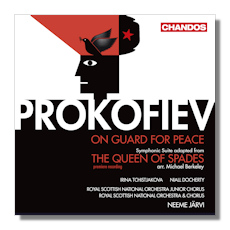
The Internet's Premier Classical Music Source
Related Links
- Prokofieff Reviews
- Latest Reviews
- More Reviews
-
By Composer
-
Collections
DVD & Blu-ray
Books
Concert Reviews
Articles/Interviews
Software
Audio
Search Amazon
Recommended Links
Site News
 CD Review
CD Review
Serge Prokofieff

Film Score Suites
- On Guard for Peace
- The Queen of Spades
Irina Tchistakova, mezzo-soprano
Niall Docherty, boy soprano
Royal Scottish National Orchestra, Chorus & Junior Chorus/Neeme Järvi
Chandos CHAN10519
Flash: this disc is a must for Prokofiev mavens. It features rarely-heard and never-before-heard music in fine performances and excellent sound. End of review? Not so fast. The Queen of Spades suite, adapted from the film score by Michael Berkeley, offers music that Prokofiev provided for an unrealized film score for Pushkin's The Queen of Spades (1937). While the work has many compelling moments, it simply was never intended to be heard in the concert hall as a stand-alone score. (Neither was Kije or Nevsky – that's why Prokofiev distilled their finer moments into a suite and cantata, respectively.) Realizing this, composer Michael Berkeley fashioned a suite from the work and in the process "elaborated" on some of Prokofiev's music. Abram Stasevich did much the same, quite successfully, with the film music provided for two parts of Ivan the Terrible. Berkeley didn't do a bad job, mind you, but what he's given us is a work part-Prokofiev and part-Berkeley. That said, it's mostly Prokofiev – and fairly decent Prokofiev, at that. But the work is a mish-mash and fails to register strongly.
The first section, Introduction and Allegro, offers probably the best music: there's an agitated theme heard shortly after the introduction that is prime Prokofiev and a melody heard later on that was used in War and Peace (and also in Evgeny Onegin [1937], another unrealized score). The second section, Adagio, presents a melody that would become the main theme to the third movement of Prokofiev's Fifth Symphony, a work that would come nine years later. Järvi unaccountably rushes the theme – this IS an Adagio, after all, not a Moderato. The Scherzo comes next, a jovial, sunny piece of undeniable appeal. The Finale, the longest of the four movements in this 32-minute score, opens up with the War and Peace theme and goes on to include the Fifth Symphony music and the agitated theme from the first section. Much interesting music follows and Berkeley manages to make it all sound like Prokofiev. Let me say that Berkeley has taken on a tough task admirably, but in the end the work doesn't quite succeed. That may not be his fault, since the work seems to resist taking on any incarnation in the concert world. It is better left to Prokofiev mavens, like me, in its original form. Michail Jurowski, with the Radio Symphony of Berlin, recorded the whole score for Capriccio (reissued in March 2009) that is probably the more coveted version of the music, though it sounds like a patchwork.
On Guard for Peace was abjectly condemned for years in the U.S. and Western Europe as a cheap Soviet propaganda piece. I remember the time well: in the 1950s and '60s it was cited as an example of a major composer knuckling under to the regime to produce music for its evil purposes. It really isn't propaganda, though, and its music is fairly decent but not top-notch Prokofiev. Much of it is quasi-bombastic, but damn, it has melodies that are unforgettable: try #7, Lullaby, wherein the mezzo-soprano and boy soprano sing music you will never forget, music featuring one of those magical Prokofiev themes that will go through your head at work, at rest and almost anywhere. But the bombast of the closing sections reduces the impact of the work. The old Rozhdestvensky recording on Melodiya, with mezzo-soprano Irina Arkhipova, was better, and the Yuri Temirkanov on RCA wasn't bad, either, but was coupled with a mediocre Shostakovich work, the Song of the Forests. (Now that's a propaganda piece!). As far as I know there have only been these three recordings of On Guard for Peace, and if I had to pick one I'd take Rozhdestvensky, but it is unavailable. Thus, this Järvi effort on Chandos fills an important gap.
On a personal note… Those who have followed my reviews on Classical Net know I have a special fondness for the music of Prokofiev. But this music is not essential Prokofiev, though it is quite well performed and presented in excellent sound. Chandos is to be commended for presenting these two worthwhile scores in a major release.
Copyright © 2009, Robert Cummings




















